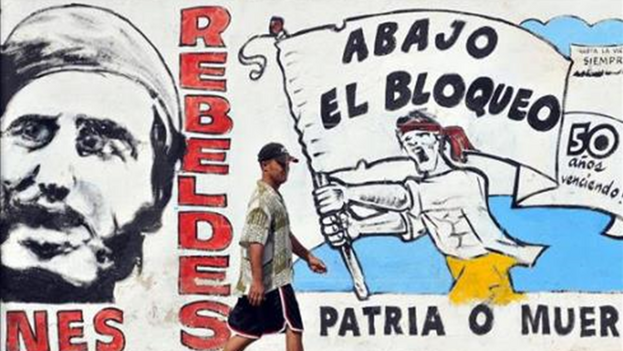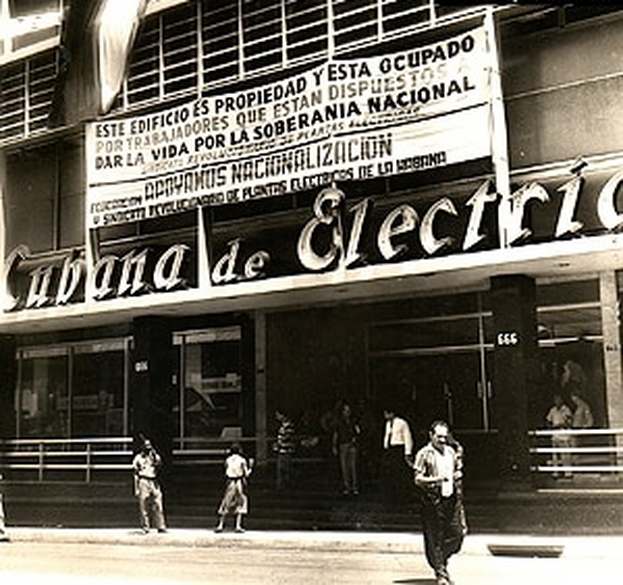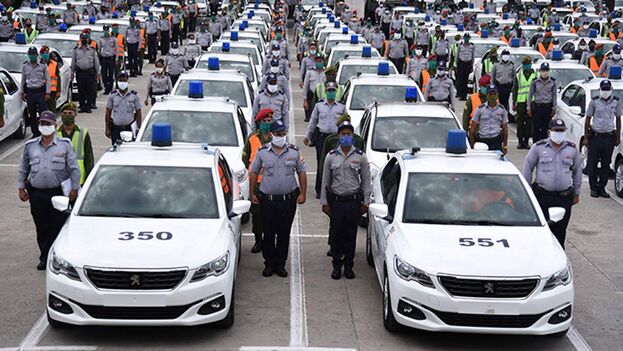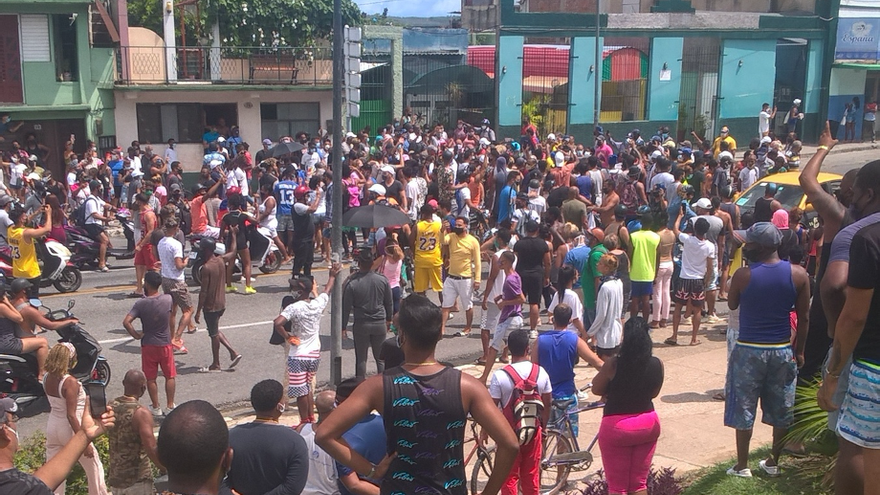
![]() 14ymedio, Luis Zúñiga, Miami, 5 February 2022 — On June 5, 1960, Fidel Castro ordered the nationalization of the Texaco company’s oil refinery in Cuba. The following month, on July 5, he ordered the seizure of the two remaining US refineries, Shell and Esso. Castro let the owners know that there would be no monetary compensation for the nationalizations. The response of the president of the United States was to cancel the sugar quota of 3 million tons that the US bought annually from Cuba.
14ymedio, Luis Zúñiga, Miami, 5 February 2022 — On June 5, 1960, Fidel Castro ordered the nationalization of the Texaco company’s oil refinery in Cuba. The following month, on July 5, he ordered the seizure of the two remaining US refineries, Shell and Esso. Castro let the owners know that there would be no monetary compensation for the nationalizations. The response of the president of the United States was to cancel the sugar quota of 3 million tons that the US bought annually from Cuba.
A month later, in August 1960, Castro ordered the nationalization without compensation of 38 US companies, including the 36 sugar mills they owned and the telephone and electricity companies. In addition, he imposed an extraordinary increase in tariffs on imports of American products. Washington then made the decision to suspend the export of merchandise to Cuba, with the exception of medicines and food. Two months later, in October 1960, Castro ordered the nationalization of all foreign banks and the confiscation of all remaining US companies in Cuba. The total value of those seizures was assessed at the time at just over $1 billion [translator’s note: roughly $9.4 billion today].
On January 3 of the following year, 1961, diplomatic relations were severed. A few months later, in March, the US Congress passed the Foreign Assistance Act and President John F. Kennedy, based on it, ordered a trade embargo on Cuba.
By excluding the United States from payments for nationalized properties and businesses while giving payment guarantees to the rest of the affected countries, Fidel Castro demonstrated that his action was based on hatred of that country and the desire to start a confrontation with it. The explanation given by President Kennedy to Congress for imposing continue reading
LEGALITY OF THE EMBARGO
With very small differences, all the legislation of the democratic countries of the world coincide in the definition, conception and application of the laws related to the nationalization of foreign properties and businesses. The classic definition states: “The nationalization measures entail an obligation on the part of the nationalizing State to pay fully for the damages to the injured foreign owner. The expropriation must be followed by a prompt, adequate and effective compensation to the owners.”
Numerous governments around the world have nationalized foreign properties, but generally those governments have compensated the owners adequately. Russia, Venezuela and Brazil nationalized the oil industries, Bolivia the natural gas industry and Chile the copper industry, just to mention a few examples of countries in the region.
CORRECT DEFINITION: BLOCKADE OR EMBARGO?
The Castro regime calls the embargo a “blockade” with the evident purpose of magnifying its impact and presenting itself as a victim, which, logically, arouses sympathy or pity in the world because Cuba is a small country and the United States is a large and powerful one. This propaganda manipulation has been used with remarkable efficiency and has been replicated by all the world’s leftist governments. But what is true and undeniable is that the aggressor was the Castro regime and the US embargo was the response to the confiscatory aggression, which, by the way, is still maintained to this day. Castro persistently refused to pay the Americans whose property was confiscated while he compensated all other foreign businesspeople.
In addition to false, the use of the word “blockade” is bombastic. Historically, the economic blockade of a country implies measures that have not been used in the case of Cuba, such as surrounding the country with warships and blocking the airspace to prevent goods and supplies from reaching that country. The United States did this against Haiti in 1993, seeking to force the Haitian military regime to return political power to the last democratically elected president in that country, Jean-Bertrand Aristide. Cuba has no US ships or planes surrounding it.
A blockade also implies that the country cannot trade — that is all access to the country is blocked — and Cuba trades with the entire world. A blockade must include the impossibility of carrying out banking and financial transactions with other countries. Cuba conducts normal transactions with other countries. The only such transactions that are limited or controlled are those directly with the United States or those subject to restrictions for suspected links to terrorist groups, money launderers or their front people.
In short, the island of Cuba is not subject to any blockade.
THE EMBARGO BETWEEN 1962 AND 1991
In that nearly 30-year period, between 1962 and the disintegration of the USSR, Castro rarely referred to the US embargo in his speeches. From the beginning of 1960, Castro began to receive economic and financial aid from the Soviet Union and from all the communist countries of Eastern Europe. Politically, Castro mocked the sanctions, implying that they did not affect him and that they had no impact on his national or international decisions.
In addition to free economic and military aid, the Soviets extended extensive lines of credit to Castro. In 2015, the amount of the debt for these lines of credit with the former Soviet Union, today Russia, was officially known: just over 35 billion dollars. That figure confirms why Castro did not even mention the US embargo. With the end of the Soviet Union in 1991, the subsidies and credits that kept the regime afloat economically ended. From that moment on, the embargo became the subject of constant complaint by Fidel Castro and his regime.
RELAXATIONS TO THE COMMERCIAL EMBARGO
Some presidents of the United States have modified the restrictions imposed by the embargo, seeking with these incentives to get the Cuban regime to improve the situation of human rights on the island. In 1975, Gerald Ford issued an executive order that allowed foreign subsidiaries of United States companies to sell their products to Cuba. The volume of trade between the subsidiaries of the United States and Cuba reached, in 1991, the figure of 718 million dollars.
President Jimmy Carter also introduced changes to the embargo. In 1977, he authorized trips to Cuba by exiles who had relatives on the island. That change meant an important economic injection for the Cuban regime and Castro then allowed those trips that were previously prohibited for Cuban exiles. This Carter modification is what makes it possible for billions of dollars in remittances to reach Cuba every year. In 2018, the year before the coronavirus pandemic, exiles sent some $2.5 billion to their relatives in Cuba.
Bill Clinton, in 1992, increased the limits on sending of money remittances to Cuba up to 300 dollars per month and authorized the visits of groups of religious, students and academics to Cuba. The then president also authorized the Castro regime to buy any amounts of medicine and food if they were paid for in cash. The measure was later expanded to include clothing, shoes, and a wide range of items.
The figures of the volumes of food purchases that the Castro regime began to import from the United States varied according to the economic situation. The following are the rounded figures from the United States Department of Commerce regarding the values of food exports to Cuba between 2000 and 2021:
Year 2000: 498 million dollars;
2001: $532 million;
2002: $553 million;
2003: $395 million;
2004: $392 million;
2005: $350 million;
2006: $560 million;
2007: $641 million;
2008: $710 million;
2009: $528 million;
2010: $363 million;
2011: $363 million;
2012: $464 million;
2013: $359 million;
2014: $299 million;
2015: $185 million;
2016: $241 million;
2017: $291 million;
2018: $271 million;
2019: $286 million;
2020: $176 million;
2021 (through September): $235 million.
Some imports to Cuba are striking. In 2020, the Castro regime imported $70.6 million worth of beer from the United States. In 2015, it imported whiskey worth $61.3 million. In 2003, newsprint for $4.4 million.
The United States is Cuba’s fifth largest trading partner in terms of trade volume. In addition, according to the US Department of Agriculture, that country supplies about 96% of the rice and 70% of the poultry products consumed in Cuba. It also exports wheat, corn, soybeans and their derivatives on a large scale.
Additionally, between 2014 and 2020, the US authorized the sending to Cuba of donations of a wide range of medical products, special foods and medical equipment worth almost 36 million dollars.
With these exports and donations from the United States to Cuba, what blockade is the regime talking about? In reality, the remaining restrictions of the Act are not even consistent with the concept of a trade embargo.
OTHER AMERICAN COLLABORATIONS WITH CUBA
Due to the serious epidemiological crisis that the Island is suffering, in November 2021 President Joe Biden authorized the US airlines IBC Airways and Skyway Enterprises to carry out charter flights with humanitarian aid. The planes would transport up to 7,500 pounds of medical supplies, food, medicine, hygiene items and other supplies that cannot be purchased on the Island.

A revealing fact about the falsehoods of the Castro regime regarding the embargo occurred on July 15, shortly after the massive protests in Cuba. That day, the Prime Minister, Manuel Marrero, issued an order lifting, until the end of the year, the restrictions on the entry of food and medicine that travelers may bring to Cuba through the airports. That restriction on the entry of these products from the United States had not been imposed by the United States but by the Castro regime itself.
THE PROPAGANDA OF THE EMBARGO REGIME IS MASSIVE AND DISTORTED
The propaganda about what the regime calls the “blockade” is constant, identifying it as the cause of all the country’s problems, the shortages of both food and medicine as well as construction materials, buses, trains, electric light bulbs and even paper. Many wonder, what do things Cubans don’t have available to them — such as the raising of pigs, chickens and cows, the cultivation of potatoes and vegetables and the fishing of shrimp and lobsters — have to do with the embargo?
The propaganda is so intense that even educated Cubans who are not sympathetic to the regime say that “the embargo must be eliminated in order to remove the constant excuses that the regime’s officials use so as not to be responsible for their failure.” Unfortunately, these people do not understand that the regime does not sustain itself with “excuses,” but with terror and police repression. They do not understand that the communist dialectic is always looking for scapegoats to blame for the mistakes and failure of its centralized economic system. If a factory does not meet the production plans, the culprit is not the communist economic system, but the official in charge of fulfilling the plans. If the country does not progress, the cause is that other nations deny it loans, but they never mention that they do not pay their debts…
When Barack Obama restored diplomatic relations with the Cuban communist dictatorship, the regime began to prepare for the possibility that the US would lift the embargo. And what did they do at that time? Well, they carried out a “study” on the damage caused by the “blockade” to the Cuban economy. The calculated amount was $822.28 billion. Thus, if the United States lifted that sanction, the regime’s next demand would be that it compensate “Cuba” with that amount. Of course, the United States would not do it, and there they would have the next excuse ready for the economic and financial disasters that Cuba would continue to suffer under Castroism. Shortages would be “justified” then by alleging that the United States did not want to pay the damages and we have to work many years to ‘heal’ the economy… The dialectic capacity of communists to create excuses is infinite.
The economic, financial and productive disaster of the Castro regime is identical to the one that was suffered and is suffered by all the communist regimes that have existed. Their economic system simply doesn’t work, but the communists will never accept it. That is part of their dogmas. Whoever does not understand it, gets confused and may end up believing in those absurd excuses.
THE ECONOMIC SANCTIONS IMPOSED BY PRESIDENT DONALD TRUMP
All of the above information supports the conviction that the US trade embargo on Cuba has been more theoretical than practical. The only prohibition that has had an impact on the Castro regime has been to give it access to credit in the United States.
This has prevented the Castros from plunging future generations of Cubans even further into debt. This reality becomes clearer to understand when we investigate the gigantic amount of money that the Castros have borrowed on behalf of the nation and that they have not repaid. The regime has never informed the people how those funds were used. The list of money (in dollars) received by the regime (and never repaid) is as follows:
– Russia : 35 billion. That country forgave 90% of the debt in 2014.
– Paris Club : 11.1 billion. The Club forgave 8.5 billion in 2015.
– China : 6 billion. That country forgave 100% of the debt in 2011.
– Argentina : 2.7 billion. Foreign Minister Felipe Solá demanded payment from Cuba at the last CELAC summit.
– London Club : 1.4 billion in commercial debts. They have already sued the regime in an English court.
– Romania : 900 million. None of it has been repaid.
– Brazil : 561 million. The Bolsonaro government has tried to collect the debt, but without success.
– Mexico : 487 million. That country completely forgave the debt in 2013.
– Spanish companies in Cuba : 325 million. They haven’t been repaid.
– Czech Republic : 276 million. They haven’t been repaid.
– Hungary : 200 million. They haven’t been repaid.
– South Africa : 137 million. That country completely forgave the debt in 2012.
A total of more than $59 billion dollars that the regime has received, that it has not returned to the lenders and that was not used to solve any of the multitude of needs that Cubans have suffered for decades, such as the lack of housing, transport problems, water supply and rural electrification, among others.
It is well known that the priority of the regime in the use of the country’s resources is what it needs to stay in power. Thus, for example, the last credit that Russia has granted the Castro regime for 50 million dollars, in October 2018, will be used, according to the Russian newspaper Kommersant, to acquire armored vehicles and helicopters. With the severe food crisis that Cuba is experiencing, this is one of the priorities of the regime.
Many will have seen the photographs that the Government published of the fleets of patrol cars that they bought for the Police and State Security, but they have not bought a single ambulance, despite the terrible lack of them. The Mercedes Benz agency in Cuba “took pity” on the people’s suffering and made a gift of 18 ambulances last March.
The priority is to strengthen the repressive and military apparatus that keeps them in power. For that indisputable reason, it is necessary to apply economic sanctions that cut off their income. Based on these premises, the ones that then President Donald Trump imposed on the Castro regime had the objective of cutting off the income of the regime’s military companies that, as we know, have appropriated businesses that produce dollars, including hotels, gas stations, hotel shops and restaurants, currency exchange offices, food markets taking payment only in dollars, rental cars, tourist taxis, etc.
The sanctions imposed by Trump were:
– Cancellation of cruise ship trips to Cuba: Each ship that arrives on the island must pay, on average, 13 dollars per passenger for the right to dock at the port and thousands of dollars more in supplies and services to the ship, including fuel. All this money goes to the coffers of military companies and it is money that is used, primarily, for repression (purchase of patrol cars for State Security and the Police, protection and attack equipment for Special Troops, electronic means for surveillance of opponents, to pay for high salaries and benefits for the police to help in the repression and for the enormous costs of the hundreds of prisons where opponents are imprisoned).
– Application of the Helms-Burton Law: This measure stops the unscrupulous foreign investors who are going to take advantage of the companies confiscated from their legitimate owners and that contribute millions of dollars in investments to the Castro military. In addition, those foreign investors will pay the regime directly for hired labor — and not the Cuban employees — the salaries in dollars, of which the military keep 90%.
– Returned Cuba to the list of countries that do not collaborate in the fight against terrorism: This sanction places the Castro regime in a fair place. In Havana, for example, there are living the leaders of the Colombian National Liberation Army (ELN), who organized the attack with a van loaded with explosives at the police school in Bogotá that caused the death of 21 people in 2020. Colombia has requested the extradition of the ELN commanders, but the regime protects them. The same is happening with the FARC, with members of Hezbollah and Hamas, and with so many other terrorist groups that found a safe haven in Cuba.
In addition, this sanction is what has prevented the Cuban military, through its company Fincimex, from taking control of remittances sent from the United States to relatives in Cuba. Fincimex is the main Cuban partner of foreign credit card companies and the Western Union money transfer company that processes the largest volume of dollar shipments to Cuba. The sanction included the recommendation to use non-military Cuban companies to send money to Cuba.
– Personally sanctioned several high-ranking Castro officials and soldiers linked to the repression against citizens who express some form of discrepancy with the regime: This includes individuals such as as the Minister of the Interior, Lázaro Álvarez Casas; General Romárico Sotomayor, head of the Political Directorate of the same ministry; and General Pedro Martínez Fernández, head of the repressive “red beret” troops. It also sanctioned Raúl Castro and his children Alejandro Castro, Nilsa Castro, Deborah Castro and Mariela Castro, as well as Raúl Castro’s former son-in-law, General Luis Alberto Rodríguez López-Calleja, president of Gaesa. The sanctions prohibit entry to the United States for them and their close relatives, as well as the freezing of funds and properties in that country. Many Cubans on the island do not know that several of those sanctioned people have traveled to the United States as tourists or as official and have purchased apartments. Many sons of those soldiers and officials of the regime even have bank accounts and properties there.
None of these measures increases the hunger of the Cuban people. None of them cause shortages of food or consumer goods. They are measures focused on taking income away from the repressive military apparatus that sustains the dictatorship.
____________
COLLABORATE WITH OUR WORK: The 14ymedio team is committed to practicing serious journalism that reflects Cuba’s reality in all its depth. Thank you for joining us on this long journey. We invite you to continue supporting us by becoming a member of 14ymedio now. Together we can continue transforming journalism in Cuba.



